
Sean Love Combs, also known by his stage name Diddy, formerly Puff Daddy and P. Diddy, is an American rapper, record producer and record executive. He is credited with the discovery and cultivation of artists such as the Notorious B.I.G., Mary J. Blige, and Usher. Combs has won three Grammy Awards from 13 nominations, two MTV Video Music Awards, and a Guinness World Record for "Most Successful Rap Producer" in 1997.

Bad Boy Entertainment, doing business as Bad Boy Records, is an American record label founded in 1993 by Sean "Puffy" Combs. During the mid-1990s, the label signed hip hop and contemporary R&B artists, beginning with the Notorious B.I.G. Following his commercial success, the label signed other acts, including Faith Evans, Mase, 112, Total, The Lox, Shyne and Carl Thomas. At its 1997 peak, Bad Boy was worth an estimated US$100 million.
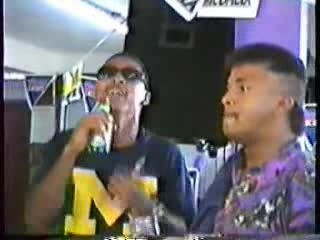
Reggaeton, is a modern style of popular music that originated in Puerto Rico during the late 1990s. It rose to prominence in the late 1990s and early 2000s through a plethora of Puerto Rican musicians. Reggaeton has been influenced by Panama's Spanish reggae, and which rose to prominence in the late 1990s and early 2000s through a plethora of Puerto Rican musicians. It has been popularized and dominated by artists from Puerto Rico since the early 1990s.

Angela "Angie" Martinez is a Puerto Rican-American radio personality, podcaster, and former rapper and actress. Dubbed "The Voice of New York", Martinez is widely known for her 28-year run at New York City station Hot 97 (WQHT). She left the station in 2014 to join crosstown competitor Power 105.1 (WWPR).
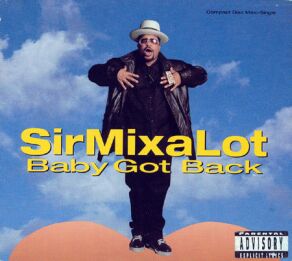
"Baby Got Back" is a song written, co-produced and recorded by American rapper and songwriter Sir Mix-a-Lot. Released in May 1992 by Def American and Reprise as the second single from his third album, Mack Daddy (1992), the song samples the 1986 Detroit techno single "Technicolor" by Channel One. At the time of its original release, the song caused controversy because of its outspoken and blatantly sexual lyrics objectifying women, as well as specific references to the buttocks, which some people found objectionable. The song's accompanying music video was briefly banned by MTV. Mix-a-Lot defended the song as being empowering to curvaceous women who were being shown skinny models as an ideal for beauty.

No Way Out is the debut studio album by American rapper Puff Daddy. It was released on July 22, 1997, by Arista and Bad Boy Records. The album is credited to "Puff Daddy & the Family"; the latter act refers to guest appearances from his signees at Bad Boy Records.
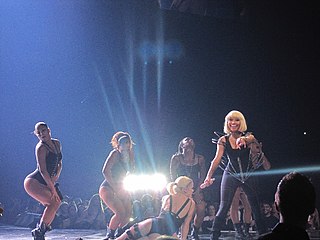
A video vixen is a woman who models and appears in hip hop-oriented music videos. From the 1990s to the early 2010s, the video vixen image was a staple in popular music, particularly within the genre of hip hop. The video vixen first came around in the late 1980s when the hip-hop culture began to emerge into its own lifestyle, although was most popular in American popular culture during the 1990s and 2000s. Many video vixens are aspiring actors, singers, dancers, or professional models. Artists and vixens have been criticized for allegedly contributing to the social degradation of black women and Latinas.
Mason Durell Betha, better known by his mononym Mase, is an American rapper. Best known for his work with Sean "Puff Daddy" Combs' Bad Boy Records, he signed with the label in 1996 and quickly found mainstream recognition as Combs' hype man. He guest appeared on Combs' 1997 single, "Can't Nobody Hold Me Down", which peaked atop the Billboard Hot 100, while his singles as a lead artist, "Feel So Good" and "What You Want" both peaked within the top ten of the chart. Released in October of that year, his debut studio album, Harlem World (1997) peaked atop the Billboard 200 chart, received quadruple platinum certification by the Recording Industry Association of America (RIAA), and spawned his third top ten single as a lead artist, "Lookin' at Me". Furthermore, his guest performances on labelmate the Notorious B.I.G.'s single "Mo Money Mo Problems" and Puff Daddy's "Been Around the World" peaked at numbers one and two on the Billboard Hot 100, respectively, that same year.

"Satisfy You" is a R&B single by American hip-hop artist and producer Puff Daddy and features vocals by American R&B singer-songwriter R. Kelly on the hook. It was released in 1999. The song spent six weeks at number one on the U.S. R&B chart and peaked at number two on the Billboard Hot 100 chart for three weeks behind "Smooth" by Santana featuring Rob Thomas. The song was co-written by both Combs and Kelly, with additional writing by R&B singer Kelly Price, who performs backing vocals. The song's beat and bassline is taken from "I Got 5 on It" by Luniz, which itself interpolates Club Nouveau's "Why You Treat Me So Bad" among others. In contrast to the original song's subject matter, which is about marijuana, the song is about satisfying the significant other. The song garnered a nomination for Best Rap Performance by a Duo or Group at the 42nd Grammy Awards in 2000.

"No One Else" is a song by American girl group Total featuring American rapper Da Brat. It was released as the second single from Total's self-titled debut studio album on November 28, 1995, by Bad Boy and Arista Records. The song was produced by Bad Boy founder Sean "Puffy" Combs and Poke of the Trackmasters, while the songwriting was handled by the two alongside the featured Da Brat and Terri & Monica vocalist Terri Robinson. The song also contains a sample from the track "South Bronx" by Boogie Down Productions.

The discography of American rapper Sean Combs consists of five studio albums, two collaborative albums, one remix album and seventy-two singles – including thirty-three as a lead artist and thirty-nine as a featured artist.
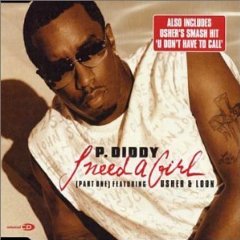
"I Need a Girl (Part One)" is a single by American rapper P. Diddy featuring Usher and Loon from the album We Invented the Remix. In 2004, the song was featured on the Bad Boys compilation R&B Hits. Along with "I Need a Girl (Part Two)", P. Diddy achieved a rare occurrence by having two parts of a song become chart hits. Part one peaked at number two on the US Billboard Hot 100 and number one on the Billboard Hot Rap Tracks chart. It also charted on the UK Singles Chart at number four. The song was ranked number 15 on the Billboard Hot 100 year-end chart in 2002. The song contains a chord progression played on a Roland JV-1080 sound module, using a patch named "Flying Waltz".

"Must Be Love" is a song recorded by American singer Cassie. It features guest vocals by American rapper Puff Daddy, who also co-wrote the song with Aion Clarke, Michael Jones, Leroy Watson and the producer Mario Winans. The song was released for digital download in the United States on April 14, 2009, by Atlantic Records under the Bad Boy imprint, impacting urban radio stations in that region on April 27, 2009.

"Been Around the World" is a song by American rapper Puff Daddy, featuring the Notorious B.I.G. and Mase and included on Puff Daddy's debut studio album No Way Out (1997). The song samples David Bowie's 1983 hit song "Let's Dance", and contains an interpolation of Lisa Stansfield's song "All Around the World", sung by the Notorious B.I.G. in the chorus. In the album version, the song concludes with a skit featuring an interview with "The Mad Producer".
Alternative reggaeton is a subgenre of reggaeton that emerged from the reggaeton movement as a reaction to its repetitive and monotone dembow rhythm, and the predominant stereotypical gangsta content that became predictable. The result was a complex sound derived from world sounds, mainly rooted in other Latin American music based genres such as bomba, plena, salsa, bachata, merengue, cumbia, tango and other foreign influenced music such as alternative rock, rock en español and Latin alternative. Mixed with thoughtful lyricism guided by an anti-colonialism discourse, Latin American sociopolitical content, and racial pride, it gave listeners a smooth blend of danceable rhythms and intellectual dialogue.
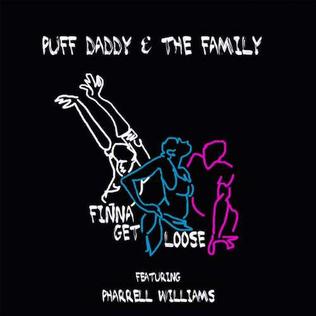
"Finna Get Loose" is a song by American rapper Sean "Puff Daddy" Combs featuring fellow American musician Pharrell Williams. Produced by the latter, it was released on June 28, 2015.

"Can't Nobody Hold Me Down" is the debut single by rapper Puff Daddy. It appears on Puff Daddy's debut studio album No Way Out and the song was released to Rhythmic contemporary radio in December 1996 and was physically released on January 7, 1997. The single was released through BMG Music, Arista Records and Puff Daddy's Bad Boy Records.

"I'll Be Missing You" is a song by American rapper Puff Daddy and American singer Faith Evans, featuring R&B group 112, in memory of fellow Bad Boy Records artist Christopher "The Notorious B.I.G." Wallace, who was murdered on March 9, 1997. Released as the second single from Puff Daddy and the Family's debut album, No Way Out (1997), "I'll Be Missing You" samples the Police's 1983 hit song "Every Breath You Take" with an interpolated chorus sung by Evans and interpolated rhythm. The song also interpolates the 1929 Albert E. Brumley hymn "I'll Fly Away" and features a spoken intro over a choral version of Samuel Barber's "Adagio for Strings".

MMM (Money Making Mitch) is the first mixtape by Puff Daddy & the Family, originally released on November 4, 2015, as a free mixtape on Bad Boy Records and Epic Records. It was later re-released on iTunes as a retail project on December 18, 2015. It served as a lead-up following the announcement of Puff Daddy's ultimately-unreleased fifth studio album, No Way Out 2, which would have been a direct sequel to his first studio album, No Way Out (1997).

American singer and actress Jennifer Lopez has had a cultural impact through her films, music, television work, dance, fashion, lifestyle and entrepreneurship. For her contributions to the arts, Lopez is regarded as one of the most influential entertainers in the world. She has also been cited as the most influential Latin entertainer of all time, credited with breaking racial barriers in the entertainment industry.


















